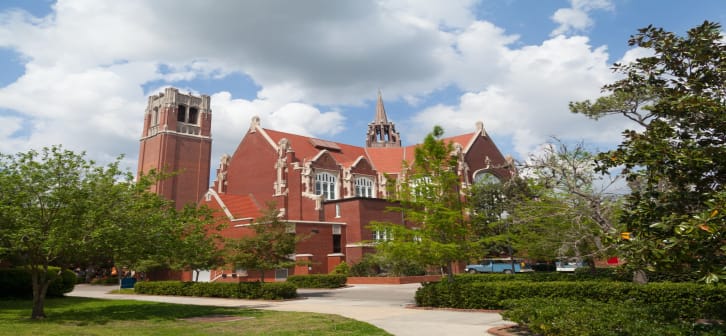Florida Nursing School Deans Talk Nursing School Investment and Record Enrollment Growth
Contributing Writer
Editor & Writer
Contributing Writer
Editor & Writer

- Florida allocated $125 million in 2022 to bolster nursing education.
- That investment is already paying off with record enrollments at two of the state's biggest public universities.
- Deans at those colleges credited new faculty and outside partnerships for the enrollment growth.
Record-breaking nursing school enrollment at two of Florida's premier public universities shows the continued enthusiasm students have to enter the profession.
That's according to the deans of the University of Florida College of Nursing (UFCON) and the Florida State University (FSU) College of Nursing after both institutions set new records for nursing school bachelor's degree enrollment this fall.
School leaders credit a potentially unlikely group of heroes for the change — Republican Gov. Ron DeSantis and his administration, which proposed and pushed for $125 million in May 2022 to help institutions in the state address its acute nursing shortage by providing more scholarships, increasing the capacity of their educational programs, and beefing up partnerships with local healthcare systems.
The key initiative was a $100 million commitment for the new Prepping Institutions, Programs, Employers, and Learners through Incentives for Nursing Education (PIPELINE) program that helped pave the way.
"We are investing in quality nursing education to increase the number of programs and jobs that prepare students for careers in nursing," DeSantis said at the time. "There has long been a need for nurses in Florida, especially as our state is growing, and we want to continue to support these front-line heroes."
The effort has paid huge dividends to date for increasing the number of Floridians with nursing school degrees — and, ultimately, the nursing workforce in the Sunshine State.
At UF, the college welcomed nearly double the number of students in its RN-BSN career program — where registered nurses (RNs) can earn their bachelor of nursing (BSN) degrees. UFCON also reported a sizable increase in its accelerated bachelor of science in nursing program, bolstered by a 40% increase at the college's Jacksonville campus.
FSU boasted similar gains. The Tallahassee institution said it normally enrolls 70-80 students in its bachelor of science in nursing program each fall, but that jumped to 150 students for fall 2023. The school also plans to enroll more BSN students in the spring and summer semesters, something it hasn't done before.
"This shows there's still a great interest in nursing," Debra Lyon, Ph.D., RN, interim dean at UFCON, told BestColleges. "[Florida lawmakers] were very serious in making a financial commitment not only to us, but to growing the entire workforce now."
BestColleges spoke with Lyon and Jing Wang, PH.D., MPH, RN, dean at the FSU College of Nursing, about how each program grew enrollments so quickly, how it spent state funds, and what this growth means for the nursing profession in Florida.
Florida Nursing School: Less Selective, More Inclusive
One thing both UF and FSU had in common in recent years was that they both routinely had to turn away willing nursing students each semester.
This seemed counterintuitive to Wang, especially given the ongoing nursing shortage.
Florida has 8.88 nurses for every 1,000 patients, according to NurseJournal — well below the national average.
Local healthcare systems are in desperate need of nurses. And yet, here was FSU, denying some students the chance to get the education needed to join the nursing workforce.
"We don't have enough nurses to take care of Floridians. And in the meantime, we're so focused on keeping small class sizes," Wang told BestColleges. "Why are we doing this?"
The best way FSU could support the local community, she said, was to expand opportunities for aspiring nurses.
FSU previously only enrolled BSN students each fall semester. Starting with the current academic year, however, FSU's College of Nursing will not only enroll double the normal number of fall students, but it will also enroll students in the spring and summer semesters.
Wang said this will drastically change the number of students that graduate each year, beginning in spring 2025.
Lyon similarly stressed that UFCON needed to find a way to enroll more students. She said the college received more qualified applicants than it could accept each year, so she set out to figure out how UF could enroll every qualified candidate.
State Funds Increase Florida Nursing School Capacity
Lyon said a lack of trained faculty was the primary reason UFCON couldn't enroll more nursing students.
An injection of state funds helped address this issue. The PIPELINE program was created in 2022 and $100 million was allocated for it. DeSantis also set aside $25 million for the Linking Industry to Nursing Education (LINE) fund for schools to recruit faculty.
Both Lyon and Wang said these funds were instrumental in their colleges' push to grow enrollment. Lyon added that not only did UF invest in hiring new faculty, but the institution set out to train clinical nurses to join its faculty. That includes paying for these new instructors to get an academic nurse educator certification.
At FSU, Wang said the school also took time to retrain faculty before the enrollment growth. That included training existing faculty to teach larger class sizes.
Professors now have more students to teach each semester, so it was important that the school tweak its program to maintain quality. One such way was to hire teaching assistants who can lead smaller discussions.
Strictly speaking, PIPELINE funds are expected to be a one-time allocation, Wang said. However, they are also tied to student success and outcomes. So, by enrolling and graduating more students who meet the program's criteria, she said, FSU hopes to continue to make the case for new PIPELINE funds that will sustain the larger cohorts the school now accepts for the nursing program.
"I am very hopeful those are not treated as a one-time fund and confident in the continued support from PIPELINE," Wang said.
She added that even if state funding were to wane in coming years, she doesn't think it will be a major setback.
Nursing School Enrollment: Challenges and Opportunities
Growing enrollment at such a fast clip comes with a new set of challenges that UF and FSU will have to tackle
At FSU, for example, Wang said the college was not physically prepared for larger class sizes this quickly.
"We have grown out of the space," she said.
She is in the process of drafting a proposal for a new nursing school building, Wang said. At the moment, the program has been using spaces in various buildings to accommodate more classes. She hopes a new building will continue to attract students and keep them in the same area on campus.
At UF, Lyon said the next step is continued growth among nontraditional students.
One such area is the institution's accelerated baccalaureate program. Students who already hold a bachelor's degree but want to become a nurse can earn a bachelor's in nursing in just 14.5 months, she said.
The accelerated baccalaureate program in Jacksonville grew 40% in fall 2023.
Lyon added that UF may continue to invest in programs outside of the school's primary Gainesville campus.
She also said that online education will become an increasingly important part of the pie. UF's new President Ben Sasse has stressed the importance of online education during his tenure so far, and the nursing program is also investing in that front.
Lyon said the online RN-to-BSN program added a new 60-person cohort this fall.
What's Next for Nursing School Programs in Florida?
Both Lyon and Wang agreed that the enrollment gains are a positive sign for nursing in Florida.
Lyon stressed that the state needed to address the nursing shortage before things really got out of hand. The Legislature's recent investments should help do just that.
"One thing about the nursing workforce, it's an aging workforce," Lyon said.
Wang added that it's "long overdue" that legislators and the surrounding community prioritize nurses. The fact that investments made a difference in enrollment so quickly is a testament to the urgency of the issue.
The next step is to continue the momentum this enrollment boost has brought.
At FSU, that includes improving facilities. Wang said that while she's pursuing a proposal for a new nursing school building, the college will also continue investments in new technology like simulation spaces and virtual reality.
Lyon said she is prioritizing partnerships with healthcare systems. UFCON's accelerated baccalaureate program places students directly in hospitals to train them, and this helps establish connections so that these students have a job opportunity immediately after graduation.
She said hospitals are excited to continue these partnerships as they help bolster staff while students are still in school.
"That's a model that we can potentially take to other hospital systems," Lyon said.
Latest News
















